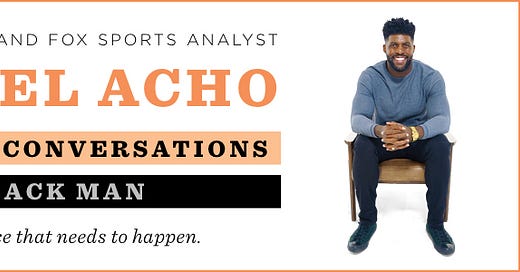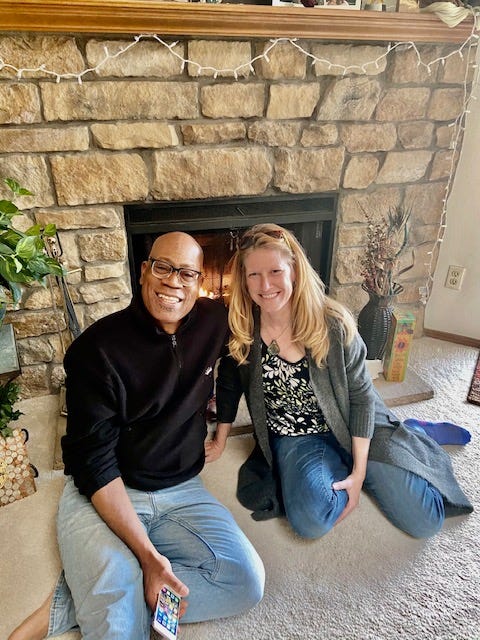Conversations With A Black Man: What I'm Learning
By Kris Wood, Guest Contributor
I love podcasts! This past year I took advantage of the pandemic and listened to many of them, introducing me to inspiring and incredibly informative authors.
Brene Brown’s podcast interview with Emmanuel Acho on his book “Uncomfortable Conversations with a Black Man” was no exception. I was inspired by their conversation, as well as by Michael Scott, the amazing person behind “Great Books, Great Minds”. So, I took the bold step of exploring more about this uncomfortable topic so that I could learn, share with others in a supportive way, and, hopefully, make a difference.
What Led Me To Read This Book
The beauty of the book’s title is that it tells you what you are stepping into. However, the kindness and patience Emmanuel conveys while diving into this multifaceted topic of racism allows the reader to gracefully step into the discomfort.
I appreciated his common sense explanations and his ability to navigate conversations between white and black culture in a clear and understandable way for readers of any culture.
About The Author
The child of Nigerian immigrant parents, Emmanuel grew up in a mostly white, affluent Dallas, Texas neighborhood where he attended private school. It wasn’t until he arrived at the University of Texas that he realized the extent of his disconnection between being a black man and an American citizen and how white-washed his childhood had been.
He notes in the book:
“If I, a first-generation-American black man, could be taught to believe distorted things in such a short time [about black masculinity], how much easier is it for a white person to believe them?”
After years of college football and the NFL where he was surrounded by other blacks, he became adept at moving between white and black cultures. This experience led him to beckon white people to enter the fray and learn about racism…how it began, how it’s perpetuated, and how each of us can make a change to this ongoing injustice.
About The Book
The book examines three types of racism: individual, systemic, and internalized. The format starts with a question posed by a white person, with Acho then responding to the question using historical references and current-day examples.
As a part of this discourse, the “Why” questions felt most impactful to me:
*WHY is our criminal justice system a perpetuation of slavery?
*WHY is saying “I don’t see color” a damaging stance to take when addressing racism?
*WHY is white privilege assumed even if one is not wealthy or highly educated?
What I learned is that the backstory on any topic is crucial to developing an understanding of what’s being debated, particularly in conversations about race, inequality, and discrimination.
Here’s one example: On the surface, being told you have white privilege may seem absurd if you come from a poverty-stricken white neighborhood where you’ve encountered scarcity, homelessness, or abuse. But one’s privilege should not be viewed as a lack of hardships and/or success. Instead, it’s the interactions and opportunities available to white people that black’s are not afforded simply because of their skin color
Acho cites an example of walking into a bank, retail store, or supermarket where a black person is often at risk of suspicion, discrimination, and/or attack. These are not typical concerns for a white person in the same situation because society has not been taught that your skin color equates to criminal, animalistic tendencies. Here’s an example of this:
Emmanuel goes on to note that the proverbial deck is stacked against anyone born with black or brown skin whereas white people are most influenced by their environment.
Learning the WHY behind each of these topics can help dispel myths or incomplete truths and bring such injustice to the forefront.
Examining Oneself
All it takes to begin, says Acho, is a willingness to look at things that make you uncomfortable. If you find yourself defensive or angry when considering these themes, imagine the angst a person of color feels as they try to navigate discriminatory environments every day.
I began to ask myself, “how can I be a catalyst for change?” Because life is not a zero-sum game, where one group has to lose in order for another to win. It is possible for all of us to rise up together.
A quote often associated with John F Kennedy, “A rising tide raises all boats” is one that speaks to the ability of us to acknowledge and correct disparities tied to the success of us all.
I am committed to considering what I don’t know rather than expound on what I think I might know. I believe this allows for awareness and growth, a quest that Uncomfortable Conversations with a Black Man can assist us with.
Surprise Discoveries From The Book
This book helped me recognize some of my own blinders when it comes to the barriers black and people of color face every day. It literally begins when they walk out their front door. It made me realize how privileged I am in my detachment.
A black colleague of mine shared a recent experience she had while in line at the post office. She was appropriately socially distanced when a white person rudely spoke up and admonished her for not moving along in the line quickly enough. My colleague responded by saying she was giving folks in front of her the space required, but she was caught off guard and felt verbally attacked by the person lashing out.
The truly sad part is that not one other person in line spoke up to support or defend the appropriateness of the action. In hearing her story, I had to question myself…had I witnessed such behavior, not knowing anyone in the situation, would I have spoken up?? I would like to think so, but my choice to engage or not engage speaks to the depth of this issue
Sadly, my colleague did not have a choice, she had to deal with disrespect and aggression directed at her and she had to deal with it in a way that would prevent an escalation of the emotions coming her way.
My Experiences
In an inclusivity training seminar I attended last year through Queer* the speaker shared an expression, “Death by a thousand paper-cuts” to exemplify how a marginalized person is impacted every day by insensitive comments, rude behaviors, and many other slights and digs that, individually, are not overwhelming. But by day’s end, these “paper cuts” add up to an ongoing flow of blood, tears, and feelings because they are viewed as “different.” Sadly, this beleaguering will start over again the very next day and every day after that…
How can I tolerate anyone living this way when respect for each other and our differences is the path to universal healing! I don’t want a homogenous society that looks, thinks, and believes all of the same things. Not only is this not possible, but insanely BORING!! It is truly the differences between our experiences, perceptions, and cultures which allow for a richer, more embodied existence for everyone on our planet!
Says Emmanuel in his book:
“The beautiful thing about the piano is that you got white keys and you got black keys. And the only way to make the most beautiful, magnificent, and poetic noise is with both sets of keys working in tandem. You can’t just play all white keys, because you won’t maximize what the instrument has to offer. You can’t just play all black keys, because you won’t maximize what the instrument has to offer. But integrate the white and black keys together, and that is when the piano makes a joyful noise.”
What Makes This Book So Valuable
“Uncomfortable Conversations with a Black Man” leads the uninformed into the world of the oppressed. Because so much of our history completely avoids the truth of a black person’s journey, very little is common knowledge.
This MUST change.
If our schools and history books will not fully disclose the truth of our past, then the responsibility falls on us, white people, to educate ourselves. I do not think my experience of being uninformed is unique. White people do not readily have this information presented to us as fact. If you are white and you read this book, I think it will powerfully impact your own journey into this complex issue of racism.
I am not perfect and may occasionally say or do the wrong thing, but missteps are part of learning. I choose to stretch and move out of my comfort zone where I can grow and I think many other white people seek this as well.
The Future Generation
I believe change is possible if we face these injustices and become an example for our children. Children often remind us how to co-exist because none of us are born with bias and prejudice.
A perfect example of this is when my then 12-year-old son and a few of his friends had a night out at the Rec Center. On the drive, one of the boys noticed a vehicle with a Blue Lives Matter bumper sticker. He said,
“Wow, don’t they get it? Of course, blue lives matter, and all lives matter. But it’s black people who are dying the most just because they are black. That’s the whole point!”
Truth from the mouth of babes (or in this case, preteens)…
My Biggest Takeaway From The Book
Honestly, I was shocked and appalled at the degree to which black people have experienced discrimination. My ignorance was staggering but so is my intention to step into the “discomfort” as Emmanuel suggests.
I believe anyone who suggests they aren’t racist is consciously or unconsciously absolving themselves of responsibility in a world where racism is as widespread and insidious as the coronavirus. It is perpetuated by a lack of information and compassion. This book can help readers take a step in the right direction.
Says Emmanuel:
"You are responsible for your biases, if for no other reason than that there are ways to make them more conscious. And when an idea is conscious, you can change your mind."
Other Resources To Explore
There is so much to learn and absorb about our treatment of black people and all people of color for that matter - past and present. I want to know more so I can do more to support my fellow Americans in stepping forward without fear or resistance to the beauty and opportunity of life that should be available to every person.
Emmanuel Acho hosts a fantastic series that is available on YouTube that speaks to many of the topics he presents in the book.
Additionally, Emmanuel offers book, film, and music recommendations, and websites where you can research specific topics He also provides a list of reputable charities doing important work and offering volunteer opportunities for those wanting to get involved and make a difference.
Being the reader that I am, here are a few books that I’m looking forward to reading:
Between the World and Me by Ta-Nehisi Coates
How to be an Anti-Racist by Ibram X. Kendi
The Vanishing Half by Brit Bennett
I’m Still Here: Black Dignity in a World Made for Whiteness by Austin Channing Brown
One Drop – Yaba Blay
Hungry Hearts: Essays on Courage, Desire and Belonging by Jennifer Rudolph Walsh, Luvvie Ajayi Jones, and others
Finally, Michael Scott (whom I am pictured with below) has a new site called “Black Books, Black Minds” that endeavors to provide a more expansive historical context on Black Americans and their profound contributions to the world. So be sure to check that out.





